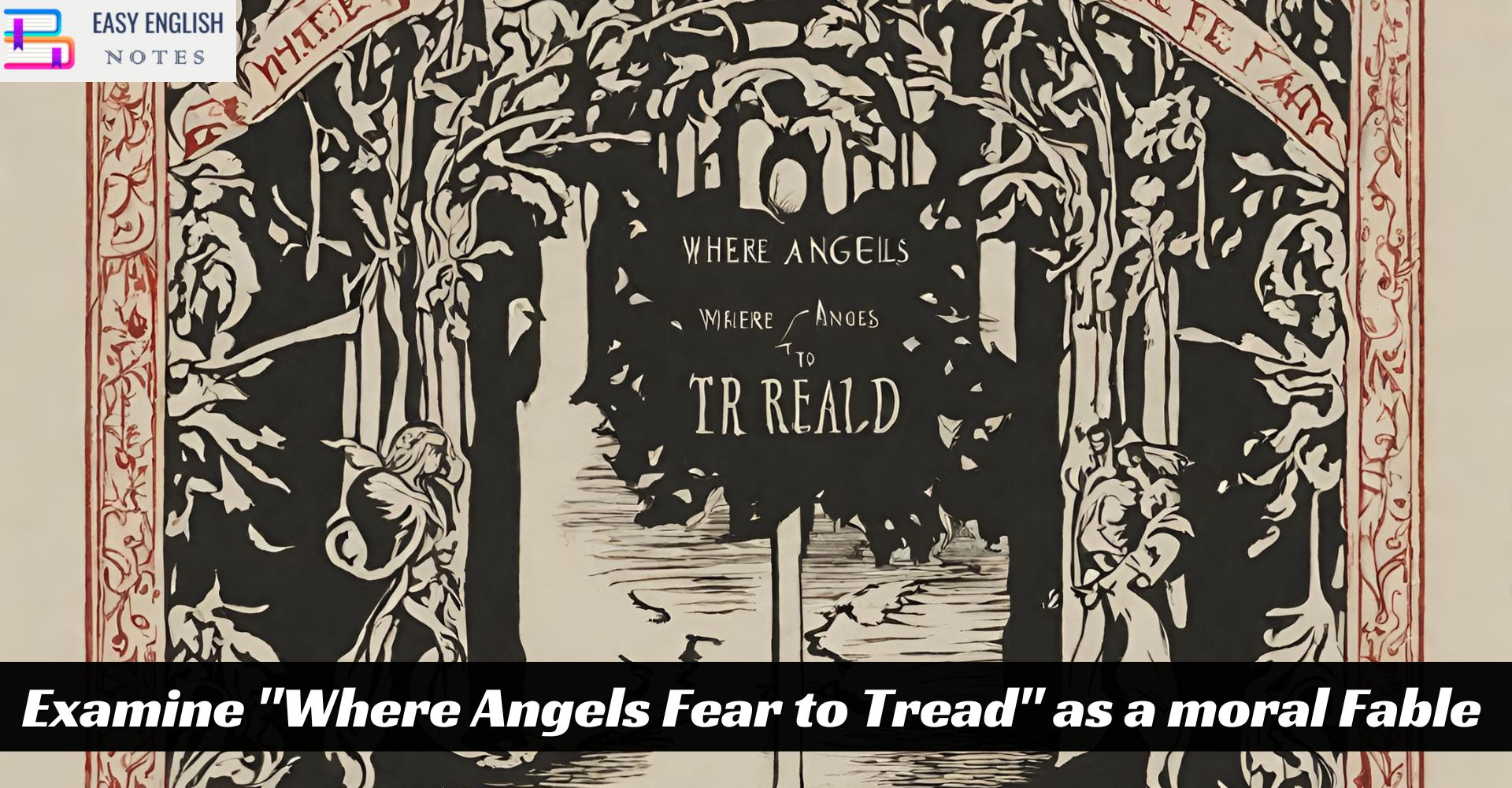Fable is a short narrative in prose which gives us a moral. In fable there are animal characters or inanimate things. “Alice in the Wonderland’ and ‘Animal Farm’ are the examples of fable. The present novel is in fact a fable in this sense that it presents a true picture of message. The message is very clear and significant. The novel give us a moral truth. If we study the whole novel there is not animal characters. But we have a very simple plot with only a handful of characters.
Though Forster’s main theme is clash between two cultures and this novel does so. The clash of culture is the dominant theme of his five novels. In ‘Where Angels Fear to Tread which is the first novel of Forster, the English Culture is constructed with the Italian Culture. In those time the Culture was very mean and vulgar. There was only vices against humanity law and virtues. Money was very mattered which could be produced most easily by sacrificing by human values of love and sympathy. Money making was the thinking of the public. So, the novelist hated this attitude and criticised this opinion in his novel. He found that the cultures of other nations like Italy and later India full of these vital human qualities. In Spite of poverty and ignorance, these cultures were more full of vigour and durability their the culture of England.
The novel gives us moral lesson. There is triumph of life over death, of sympathy over hypocrisy, of charity over materialism. Being the first novel of the novelist, the novelist has put this message with great care and artistry. The message of the novel is that the human qualities of love and sympathy of tolerance and understanding are all that matters. Everything else the lies, the distrust, the accidents of life are in fact, of very little importance.
The message in “Where Angels Fear to Tread” is artistically concealed in the details of the plot. Sawston has refinement, but it lacks sincerity and sympathy. It is marred by hypocrisy. For example the Herriton would not like the news of Lilia’s second marriage or child birth to spread in Swaston, although both are completely natural events of life. The Italian world of Gino is characterized by vulgarity and violence, but it has the warmth of human love and sympathy. Forster seeks a reconciliation of the conflict between the two cultures. He tries to present the message in ‘Where Angels Fear to Tread that human relationships are of the utmost value in life.
Also Read :
- Compare Hamlet with Macbeth, Othello and other Tragedies
- “The Pardoner’s Tale” is the finest tale of Chaucer
- Prologue to Canterbury Tales – (Short Ques & Ans)
- Confessional Poetry – Definition & meaning
- Line By Line Explanation Of The Poem The Eve of St. Agnes
Examining “Where Angels Fear to Tread” by E.M. Forster as a moral fable involves considering how the novel conveys moral lessons or truths through its narrative and characters. A moral fable traditionally uses stories and character experiences to impart wisdom or ethical guidelines. Here’s an examination of the novel in this light:
- Lessons on Cultural Arrogance and Ethnocentrism: One of the primary moral lessons of the novel is the critique of cultural arrogance and ethnocentrism. The English characters often exhibit a patronizing view towards the Italian culture, assuming their own superiority. The novel highlights the folly and consequences of such attitudes, suggesting a moral against the dangers of cultural insensitivity and the importance of respecting and understanding other cultures.
- The Danger of Romantic Idealism: The novel can be seen as a fable about the perils of romantic idealism. Characters in the story often act based on romanticized notions of love, passion, and adventure, disregarding practical and ethical considerations. Their experiences serve as cautionary tales about the risks of letting idealism cloud judgment.
- Consequences of Impulsivity and Lack of Foresight: The story illustrates the negative outcomes that can result from impulsive decisions made without proper foresight or consideration of consequences. This aspect of the novel serves as a moral lesson on the importance of prudence and deliberation in making life choices.
- Exploration of Moral and Ethical Dilemmas: Throughout the novel, characters face complex moral and ethical dilemmas. These situations serve as vehicles for exploring various moral themes, such as the responsibilities involved in familial relationships, the ethical implications of social class and wealth, and the consequences of personal actions on others.
- The Complexity of Human Relationships: The novel also functions as a fable on the complexities of human relationships. It suggests moral lessons about understanding, empathy, and the intricate nature of human connections, emphasizing the need for compassion and open-mindedness in interpersonal interactions.
- Transformation and Redemption: The novel also touches on themes of personal growth, transformation, and redemption. Characters who recognize their faults and learn from their experiences embody the fable-like moral of personal improvement and the possibility of redemption.
As a moral fable, “Where Angels Fear to Tread” offers a rich tapestry of lessons, ranging from cultural understanding and the pitfalls of romantic idealism, to the importance of foresight, ethical conduct, and personal growth. Through its narrative and character development, the novel invites readers to reflect on these moral themes and the consequences of actions in a complex and interconnected world.











